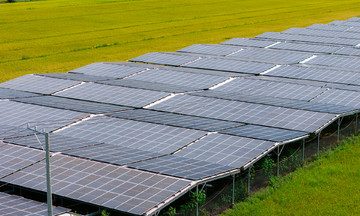This perspective was shared by Nguyen Sinh Nhat Tan, Vice Minister of Industry and Trade, at a press conference on 8/10. Mr. Tan stated that the Ministry of Industry and Trade aims to develop self-consumption rooftop solar power, therefore, "there is no reason to create difficulties."
According to the revised Power Development Plan VIII, Vietnam targets that by 2030, 50% of public buildings and 50% of residential homes will use self-consumption rooftop solar power.
In practice, under Decree 58, households and businesses installing self-consumption rooftop solar power need to notify or register with management agencies and Vietnam Electricity (EVN), depending on the system's scale.
To ensure compliance, last month EVN proposed adding penalties for organizations and individuals who install systems without notification or registration. This proposal raised concerns among many, questioning why systems used solely by households or internal businesses, and not selling electricity, still require reporting.
According to Vice Minister Tan, the regulation for installing self-consumption rooftop solar power requires notification so the electricity sector can gather information on system capacity, thereby ensuring reasonable supply plans.
However, he emphasized that relevant agencies need to advise citizens to understand the requirements, and that registration or notification procedures should be simple and available online. Currently, the Ministry of Industry and Trade has assigned the Electricity Regulatory Authority to review regulations to simplify this process.
 |
Vice Minister of Industry and Trade Nguyen Sinh Nhat Tan. Photo: VGP |
Adding further, Bui Quoc Hung, Deputy Director of the Electricity Regulatory Authority, explained that when installing rooftop solar power, only a few households in mountainous regions cannot connect to the national grid. As they operate independently, these households are not required to register or notify.
The majority of customers installing this type of energy still need to use the national grid, including purchasing electricity from EVN for household needs. This means that when solar power is unavailable, they still rely on EVN's electricity. Therefore, these households must notify authorities about their usage needs to ensure a balanced supply and demand.
"If someone installs rooftop solar power without registering but still wants to use EVN's grid electricity, the provider cannot respond immediately", he added.
Currently, there are approximately 103,000 rooftop solar power projects nationwide, with a total installed capacity exceeding 9,500 MW.
E-commerce fraud and regulation
Regarding the case of Chu Thanh Huyen – wife of footballer Quang Hai – who was accused of selling cosmetics online and issuing invoices with unclear origins, Bui Nguyen Anh Tuan, Deputy Director of the Domestic Market Management and Development Agency, stated that "the case is relatively complex, with some indications related to criminal activity."
Mr. Tuan added that market management forces have instructed the plaintiff to forward the complaint to the competent authorities for handling.
Speaking further on controlling goods on e-commerce channels, Nguyen Thi Minh Huyen, Deputy Director of the E-commerce and Digital Economy Agency, stated that since the beginning of the year, operators have removed 44,000 infringing products and 2,000 stores on online platforms. The removed products primarily belong to categories prone to commercial fraud and smuggling, such as household goods, fashion, and footwear.
The Ministry of Industry and Trade is finalizing the draft amended Law on E-commerce, expected to be submitted to the National Assembly for approval during the October session. A key focus of the draft is controlling counterfeit goods, pirated goods, and intellectual property infringement in e-commerce. The draft adds provisions for seller identification through identification codes to trace origins, control goods flow, and more effectively prevent commercial fraud.
By Phuong Dung












